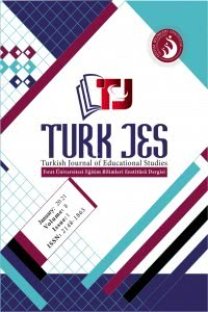Fen ve Teknoloji Dersinde Ortaokul Öğrencilerine Yönelik Akran Değerlendirme Etkinlikleri
Öğrenmenin değerlendirilmesinde akran değerlendirmenin kullanılmasının faydalı olduğu bildirilmektedir. Bu çalışma ortaokul öğrencilerin akran değerlendirme deneyimlerini ve akran değerlendirmenin öğrencilerin Fen ve Teknoloji dersine ilgilerini artırıcı bir yöntem olarak nasıl kullanılabileceğini açıklar. Çalışma öncesi pilot çalışma yapılmış ve performans değerlendirme rubriği geliştirilmiştir. Pilot uygulama yapıldıktan sonra, 6. sınıf (n=54), 7. sınıf (n=30) ve 8. sınıf (n=30) öğrenci olmak üzere toplam 114 öğrenciyle çalışma gerçekleştirilmiştir. Öğrenciler sınıf mevcutlarına göre üçerli veya dörderli gruplara ayrılmıştır. Öğrenciler hazırladıkları performans görevlerini sunarken, performans değerlendirme rubriği kullanılarak akranları tarafından değerlendirilmişlerdir. Çalışmada, öğretmen değerlendirme ve öz-değerlendirme de yapılmıştır. Ayrıca, öğrencilerin akran değerlendirme yöntemine yönelik tutumlarını belirlemek için 25 maddelik, Likert tipi Akran Değerlendirme Tutum Anketi geliştirilmiştir. Öğrencilerin uygulama öncesi ve sonrası tutumlarındaki değişimi belirlemek için elde edilen veriler eşleştirilmiş t-testi kullanılarak analiz edilmiştir. Akran değerlendirme uygulaması sonucunda, öğrencilerin tutumlarında anlamlı bir şekilde pozitif bir değişiklik olduğu görülmüştür.. Kız ve erkek öğrencilerin tutumları arasında, istatistiksel olarak anlamlı bir fark bulunmamıştır. Akran ve öğretmen değerlendirme puanları karşılaştırıldığında, pozitif ve yüksek korelasyon olduğu görülmüştür.
Peer Assessment Activities For the Secondary Students in Science and Technology Course
The use of peer assessment as an alternative form of evaluation method is reported to be helpful in learning. This paper enhanced students’ experiences of peer assessment and describes how peer assessment was implemented as a method of enhancing secondary students engagement in Science and Technology Course. During the training session, Performance Task Rubric was developed. After the training session, in the main application, 6th grade (n=54), 7th grade (n=30) and 8th grade (n=30) with a total of 114, participants, were divided into groups of three or four depending on the class size. Students made their oral presentations on performans tasks and were evaluated using the Performance Task Rubric by peers. Teacher assessment and self-assessment were also conducted in the study. Additionally, Peer Assessment Attitude Questionnaire, has 25 item Likert type, developed to determine the students’ attitudes towards the method of peer assessment. To determine the significance of the change in students’ attitudes before and after training paired samples t-test was used. Students' views on peer assessment was a positive change post-implementation training in a meaningful way. The statistical comparison between female and male responses to pre test and post test was not significant. The statistical comparison regard to between female and male responses to pre test and post test was not significant. The results of the study revealed that the between peer and teacher assessment scores of classes were positive and high correlations as compared.
- ISSN: 2458-8210
- Başlangıç: 2014
- Yayıncı: Fırat Üniversitesi
Sayıdaki Diğer Makaleler
Eğitim Kurumlarında SWOT Analizi
Mukadder Boydak ÖZAN, Hakan POLAT, Seda GÜNDÜZALP, Zübeyde YARAŞ
Tayfun TUTAK, Muatafa AYDOĞDU, Alev AKGÜL
Fen ve Teknoloji Dersinde Ortaokul Öğrencilerine Yönelik Akran Değerlendirme Etkinlikleri
Gonca KEÇECİ, Gamze KIRILMAZKAYA, Fikriye Kirbağ ZENGİN
Öğrenme Yönetim Sistemlerinde Kullanılan Öğrenme Analitikleri Araçlarının İncelenmesi
OKUL ÖNCESİ ÖĞRETMEN ADAYLARININ BAKIŞ AÇISIYLA İYİ EĞİTİM İÇİN TEMEL YEDİ İLKE
Fen ve Teknoloji Dersinde Ortaokul Öğrencilerine Yönelik Akran Değerlendirme Etkinlikleri
